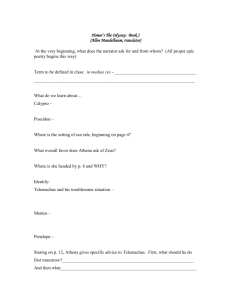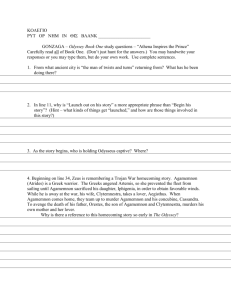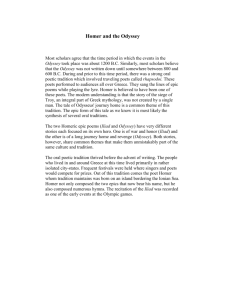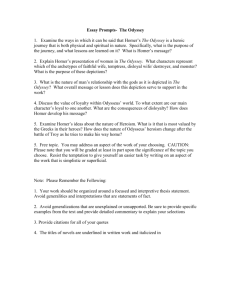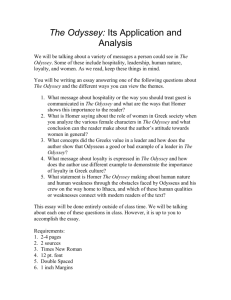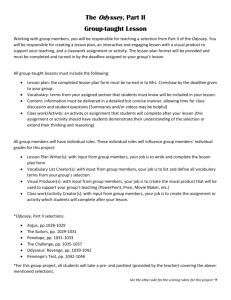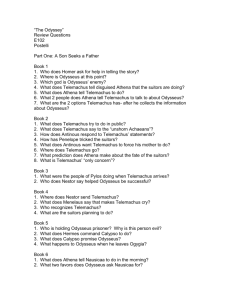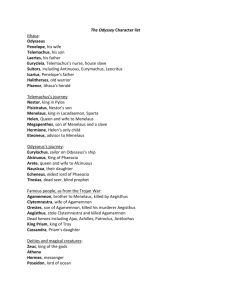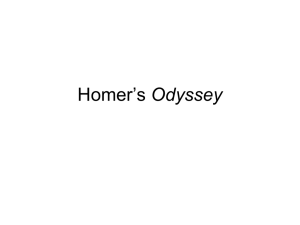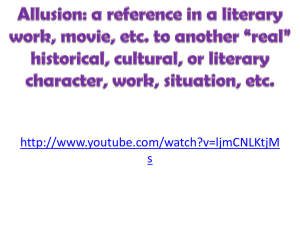words - University Honors College
advertisement
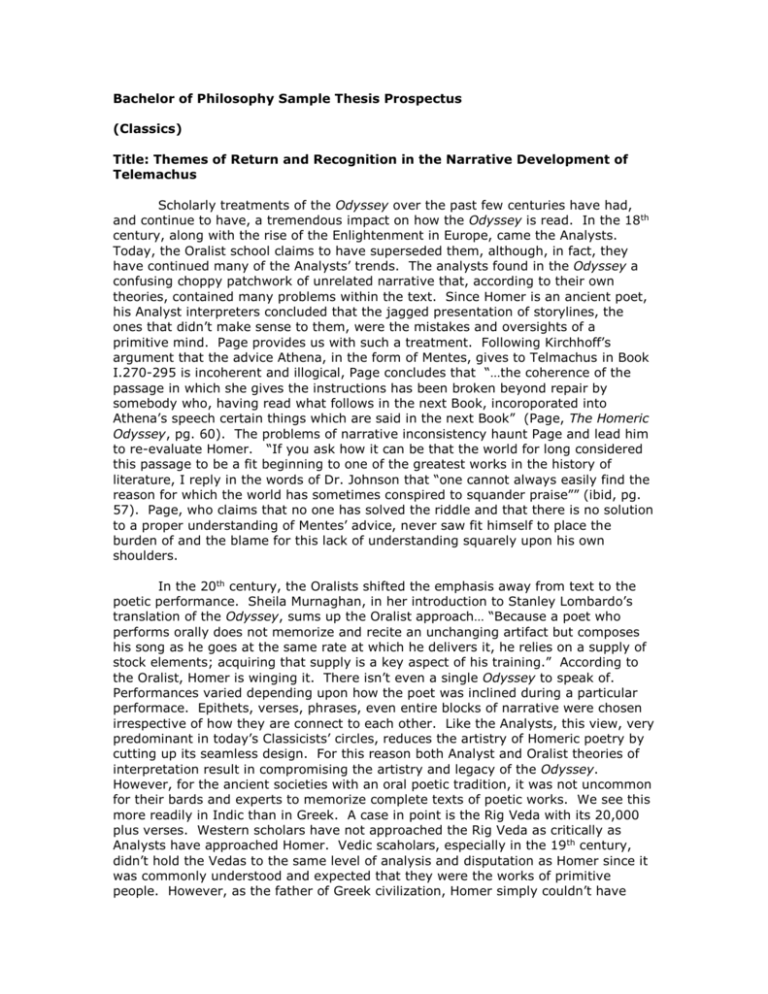
Bachelor of Philosophy Sample Thesis Prospectus (Classics) Title: Themes of Return and Recognition in the Narrative Development of Telemachus Scholarly treatments of the Odyssey over the past few centuries have had, and continue to have, a tremendous impact on how the Odyssey is read. In the 18th century, along with the rise of the Enlightenment in Europe, came the Analysts. Today, the Oralist school claims to have superseded them, although, in fact, they have continued many of the Analysts’ trends. The analysts found in the Odyssey a confusing choppy patchwork of unrelated narrative that, according to their own theories, contained many problems within the text. Since Homer is an ancient poet, his Analyst interpreters concluded that the jagged presentation of storylines, the ones that didn’t make sense to them, were the mistakes and oversights of a primitive mind. Page provides us with such a treatment. Following Kirchhoff’s argument that the advice Athena, in the form of Mentes, gives to Telmachus in Book I.270-295 is incoherent and illogical, Page concludes that “…the coherence of the passage in which she gives the instructions has been broken beyond repair by somebody who, having read what follows in the next Book, incoroporated into Athena’s speech certain things which are said in the next Book” (Page, The Homeric Odyssey, pg. 60). The problems of narrative inconsistency haunt Page and lead him to re-evaluate Homer. “If you ask how it can be that the world for long considered this passage to be a fit beginning to one of the greatest works in the history of literature, I reply in the words of Dr. Johnson that “one cannot always easily find the reason for which the world has sometimes conspired to squander praise”” (ibid, pg. 57). Page, who claims that no one has solved the riddle and that there is no solution to a proper understanding of Mentes’ advice, never saw fit himself to place the burden of and the blame for this lack of understanding squarely upon his own shoulders. In the 20th century, the Oralists shifted the emphasis away from text to the poetic performance. Sheila Murnaghan, in her introduction to Stanley Lombardo’s translation of the Odyssey, sums up the Oralist approach… “Because a poet who performs orally does not memorize and recite an unchanging artifact but composes his song as he goes at the same rate at which he delivers it, he relies on a supply of stock elements; acquiring that supply is a key aspect of his training.” According to the Oralist, Homer is winging it. There isn’t even a single Odyssey to speak of. Performances varied depending upon how the poet was inclined during a particular performace. Epithets, verses, phrases, even entire blocks of narrative were chosen irrespective of how they are connect to each other. Like the Analysts, this view, very predominant in today’s Classicists’ circles, reduces the artistry of Homeric poetry by cutting up its seamless design. For this reason both Analyst and Oralist theories of interpretation result in compromising the artistry and legacy of the Odyssey. However, for the ancient societies with an oral poetic tradition, it was not uncommon for their bards and experts to memorize complete texts of poetic works. We see this more readily in Indic than in Greek. A case in point is the Rig Veda with its 20,000 plus verses. Western scholars have not approached the Rig Veda as critically as Analysts have approached Homer. Vedic scaholars, especially in the 19 th century, didn’t hold the Vedas to the same level of analysis and disputation as Homer since it was commonly understood and expected that they were the works of primitive people. However, as the father of Greek civilization, Homer simply couldn’t have made the glaring inconsistencies that they Analysts attributed to him. According to the Analysts, any textual inconsistency found by them exposed a complex pattern of incorporating various strains of narrative that originated from different bards. But what does the odyssey itself have to say about the role of Telemachus? It is my contention that the Odyssey comprises a seamless narrative of the return of two heroes, Odysseus and Telemachus. I have examined many of the arguments of Homer’s critics. In contrast to them I find that the narrative of Telemachus in Books I – IV and XV – XXIV, in fact, runs throughout the entire epic, from Books I – XXIV. There is a development of Telemachus in the Odyssey, from a passive youth who is tormented by the suitors’ actions in Book I, into an active hero who becomes the living agent of Athena’s planned destruction of the suitors. By epic’s end, Telemachus will have achieved an equal status with his father, Odysseus. My project for the B. Phil will be an in depth reading and analysis of Homer’s Odyssey in the original Greek with a special emphasis on the connection between “return” and “mind”. I will examine in the arguments, pros and cons, for the linguistic connection between Vootoc and vooc, as developed by Douglas Frame. The focal point of my investigation is the theme of return and recognition with special attention paid to the character Telemachus and his development through the narrative. I will investigate and determine the Indo-European elements that make up this theme through an examination of parallels between Ancient Greek and other Indo-European languages such as Sanskrit. In the Odyssey, the relationship between “rememberence” and “return” is crucial. Frame discusses this connection in his Myth of Return in Early Greek Epic. He shows how two words, vooc and veouxi, stem from the verbal roo *veo-. This latter word, veouxi, specifically means “return home” and is the source from which the nominal vootoc is derived. The original source for both words, according to Frame, connects them conceptually as well. The original proto-IndoEuropean verbal root *veo – must contain a common definition that was inclusive of both “return home” and “mind”. But what exactly was this common definition? Was Homer aware of it when he composed the Odyssey? Frame bypasses the question of whether or not Homer was aware of the tradition of the relationship between “return” and “mind”, more specifically between return and recognition, in much of the Odyssey’s terminology and narrative structure, a fact that suggests an awareness of the traditional relationship between vooc and veouxi. Athena’s major role in the Odyssey is also significant in my investigations. I have studied the figure of Athena and she is much different from her favorable Hollywood portrayals as just a divine benefactor and assistant to Odysseus and Telemachus. Since Fenelon’s Telamaque in the 18th century, the role of Athena has been seen as a mentor who aids Telemachus through a process of education. Another quote from Murnaghan gives insight into the typical view of the relationship between Telemachus and Athena. “The aim of Telemachus’ voyage is, specifically, information that might help to clarify and resolve the situation on Ithica but, more broadly, education…With the subtle guidance of Athena, who accompanies him, now in the disguise of Mentor…Telemachus first visits Nestor in Pylos and then Menelaus and his wife, Helen, in Sparta.” As illustrated by this quote, current views on Athena generally associate her with wisdom, learning, and counsel. She is the humanfriendly goddess that helps Odysseus get past Poseideon and get home to Ithaka. She is the mentor who helps Telemachus upend the suitors and develop into a man. These views, however, are only part of the story. For Athena herself is initially the culprit behind the disastrous return of Odysseus, and many of the other Achaeans, to being with. This aspect of Athena’s involvement, treated at length by Jenny Strauss Clay in her Wrath of Athena, is typically ignored in popular representations of the goddess in the Odyssey. Additionally, there is the Athena who presents Telemachus with various bits of misinformation-the garbled and incoherent advice of Mentes in weakened in her resolve not to remarry and is about to cave-in to the suitors. Her manipulative persona persists in her dealings with Odysseus as well. She even leads Odysseus into compliance with her open revolt against Zeus in Book 24. at the heart of Athena and Zeus’ conflict is the preservation of social order. Here, Zeus is the preserver and reconciler between Odysseus’s camp and they Ithacan families of the dead suitors. Athena, in contrast, is presented as a threat to that order. It takes a thunderbolt from Zeus to restrain her. What do we do with this? Many have swept these depictions of Athena under the carpet in an effort to present a nice story to the general public. But, this has severe consequences to a reading of the text. These popular representations undermine much of Homer’s genius and craft, and cover up the traditional concepts derived from the Proto-Indo-European lexicon.
